As an NC State Extension Area Agent, Lisa Rayburn provides technical support to commercial fruit and vegetable growers in a four-county region in eastern North Carolina. Her work as an Extension agent recently became the catalyst for Rayburn to expand her expertise and pursue a master's degree in horticulture to better serve her growing community.
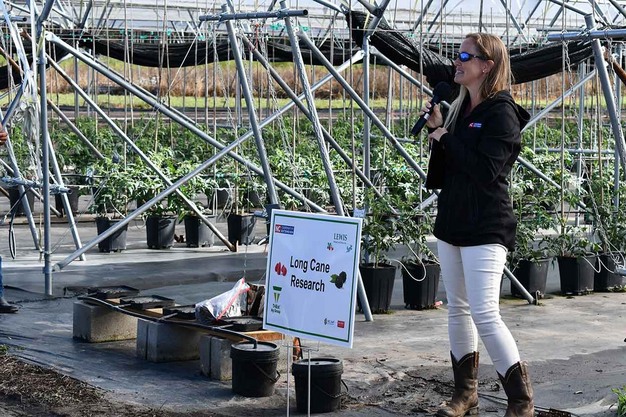 Lisa Rayburn presented long-cane research at the 2021 NC Commercial Blackberry and Raspberry Growers Field Day at Lewis Nursery and Farms.
Lisa Rayburn presented long-cane research at the 2021 NC Commercial Blackberry and Raspberry Growers Field Day at Lewis Nursery and Farms.
This fall semester, Rayburn just wrapped up two seasons of evaluating pine bark as an alternative to coco coir as the substrate for long-cane raspberry production in the southeastern United States. This season, the team is evaluating plant spacing densities and pruning practices to see if they can reduce input costs and labor while maintaining yield.
What inspired you to pursue your horticulture degree?
I grew up on a family farm where we raised beef cattle, dairy goats, pick-your-own strawberries, and all of our own vegetables. As I was narrowing down my career choices, I knew that I wanted plants and food production to be my focus, so I studied horticulture at West Virginia University. I loved being outside, watching the plants grow, and seeing the harvest that was the payoff for that hard work. After college, I worked in production greenhouses and a plant tissue culture lab, and I eventually taught horticulture at a local community college. When I started with NC State Extension, I knew that I wanted to deepen my understanding of horticultural science to serve growers better. I was excited to learn more from the professors at North Carolina State University and to be part of that learning community. I knew that I wanted to do a Master of Science program, so it took some time to find the right opportunity to make that happen. Luckily, Professor Gina Fernandez had been approached by a grower and NC State alumni, Cal Lewis with Lewis Nursery and Farms, Inc., who was interested in cooperating with NC State Extension to learn more about the viability of growing long-cane raspberries in the southeastern United States.
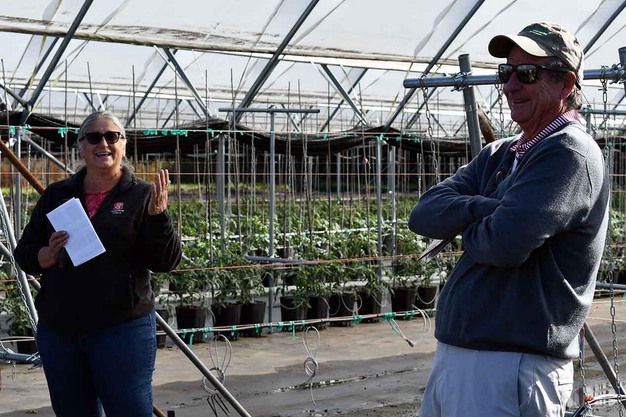 NC State Professor Gina Fernandez and Cal Lewis, owner of Lewis Nursery and Farms, Inc., hosting the 2021 NC Commercial Blackberry and Raspberry Growers Field Day (photo by Christina Wrenn)
NC State Professor Gina Fernandez and Cal Lewis, owner of Lewis Nursery and Farms, Inc., hosting the 2021 NC Commercial Blackberry and Raspberry Growers Field Day (photo by Christina Wrenn)
What is your area of research?
As part of this project, my area of research is focused on evaluating pine bark as an alternative to coco coir as the substrate for long-cane raspberry production in the southeastern US.
Raspberries are a high-value crop that cannot be grown as a perennial crop in the southeastern US due to high temperatures and disease pressure. The long-cane production system has been widely adopted in Europe, and we wanted to see if it was viable here. In a long-cane system, the raspberry plants are grown for the first year in a nursery in a cool climate. These plants, trained as two “long canes,” are then sent to the grower in the winter to be set out in pots in high tunnels. The high tunnels allow the grower to push the plants into growth and harvest earlier in the spring before the heat of summer has a negative impact on berry size and quality. The use of containers and a soilless substrate allows growers to avoid soil-borne diseases and carefully control the root environment and plant fertility. The grower can then set out new long canes in the following season, allowing the production system to be annualized and eliminating the need to keep the plants healthy and growing through the hot and humid summer. This system provides a potential way for growers to produce a new, high-value crop for local markets.
The long-cane system has its challenges, though. The initial cost of constructing high tunnels and buying plants and soilless substrates each year is significant. We are looking at ways to lower those costs and make the system work in our environment. One logical way to do this is to look for alternate substrate options. The industry relies heavily on coco coir, which has to be imported from long distances, such as Sri Lanka or India. We are looking at the feasibility of using a locally produced pine bark substrate instead. This provides not only significant cost savings but also reduces concerns about supply chain disruptions. In the 2022 and 2023 seasons, we compared pine bark head-to-head with coco coir in on-farm trials. In these trials, pine bark was able to produce comparable yields to coco coir.
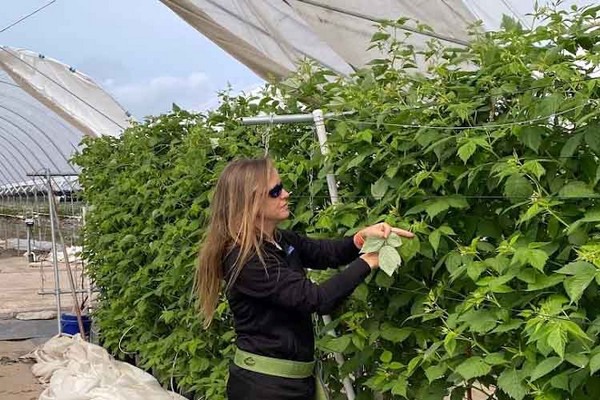 Lisa Rayburn tissue sampling long-cane raspberry plants (photo by Gina Fernandez).
Lisa Rayburn tissue sampling long-cane raspberry plants (photo by Gina Fernandez).
How are your studies complimenting your NC State Extension role?
My classes have helped deepen my understanding of the subject matter. As an undergrad, you learn in a more theoretical way of thinking about things that you might see in the future, relating to the lab activities or limited field experiences you have. When you go back to school after working as an Extension agent, your classwork has a lot more practical real-world applications. That plant nutrition problem being posed in class is something that you have seen in the greenhouse or field. The question being posed in statistical analysis relates to the last variety trial you assisted with. It’s all very applied: I can put the information to use and that keeps me engaged.
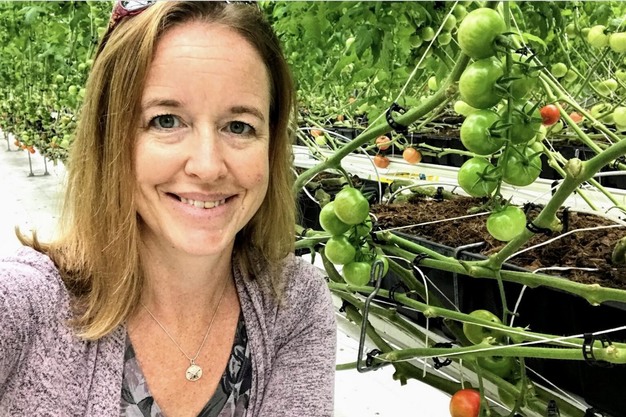 Lisa Rayburn inside a tomato greenhouse as part of her NC State Extension Area Agent role [photo by Lisa Rayburn].
Lisa Rayburn inside a tomato greenhouse as part of her NC State Extension Area Agent role [photo by Lisa Rayburn].
What has been a highlight of your graduate school experience?
I’ve had several highlights to my graduate school experience. On a personal level, the highlight has been the opportunity to work with people including NC State Professors Gina Fernandez and Brian Jackson, our cooperating grower, Cal Lewis, the staff of Lewis Nursery and Farms and our cooperating partners at TriEst Ag. It’s been a great opportunity to be part of an extraordinary team and to learn and benefit from their knowledge, perspective, and experience. On a professional level, I’ve enjoyed learning more and being able to better serve my growers on the ground and it’s really exciting to be involved in bringing a new crop production system to our region.
What recognition have you received for your research?
I was able to travel to the International Society of Horticultural Science (ISHS) Rubus and Ribes Symposium when it was held in Washington and Oregon in 2023. I was able to present our work on “Evaluating Pine Bark as an Alternative to Coco Coir for Long-Cane Production of Raspberries in the Southeastern US”. This was an amazing opportunity to learn more about the caneberry industry in the US and around the world and I was awarded the ISHS Young Minds Award for my presentation.
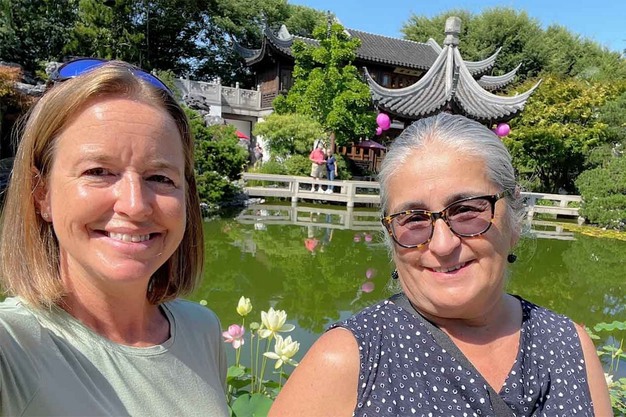 Lisa Rayburn exploring Portland, Oregon with Gina Fernandez during ISHS Rubus and Ribes Symposium (photo by Lisa Rayburn).
Lisa Rayburn exploring Portland, Oregon with Gina Fernandez during ISHS Rubus and Ribes Symposium (photo by Lisa Rayburn).
Do you have any career goals or interests?
I’m interested to see how horticulture moves forward in our area as younger growers enter the space with different backgrounds and also in the face of a more uncertain climate. There has been a big move to substrate production in Europe and that trend seems to be moving our way. I’m excited to see how our growers adopt and utilize substrate and protected culture technology over time.
Do you have any suggestions for incoming graduate students or fellow NC State Extension agents considering an advanced degree?
When you are working in extension, it can be hard to manage the demands on your time. It is easy to put off taking a class until next semester. But one of the most rewarding things about the job is the ability to learn more, have a deeper understanding of your subject matter, make stronger connections with professors and specialists on campus and to better assist your clientele. I appreciate my classes more now than I did as an undergraduate student because I can see how the classes directly relate to my day-to-day work in the field. It’s worth prioritizing that and making it happen. Choose a major that excites you. It is going to take a lot of effort and commitment but will be worth it.
If you are an agent wondering how to move forward, reach out to several specialists who work in your subject matter area and get involved in their research or programming. You already lean on them to help with programming in your county, but you can learn more by volunteering to help with a day that they are planting or harvesting a research trial in your region or supporting an event that they are conducting. You will learn more about the work being done at NC State, forge a connection and may find an opportunity to be part of a project that really excites you.
Source: cals.ncsu.edu
